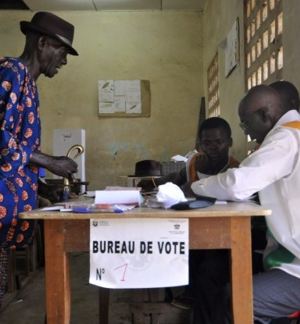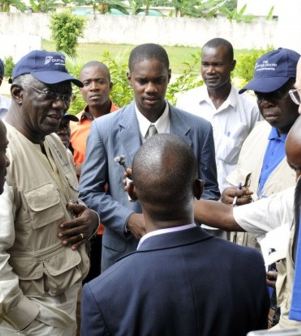|
Côte d'Ivoire Politics Ivorian elections so far successful
Ghana's ex-President John Kufour, meanwhile a symbol of democratic practices in the region, headed the Carter Centre's election observer mission in Côte d'Ivoire (Ivory Coast). In parts of the Ivorian economic capital, Abidjan, Mr Kufuor's symbolic presence helped voters overcome their fears of participating in the political process after a decade of political violence.
In the south, militias had been set up by followers of the main political leaders and their parties, which again strongly oppose the political movements of the autonomous north. President Laurent Gbagbo, a southerner seeking re-election, confronts Henri Konan Bedié, who was toppled from the Ivorian presidency in the 1999 coup. Both confront the northerner and ex-PM Alassane Ouattara. Mr Ouattara was a favourite to win the 2000 presidential election, but was barred from standing candidate. The 2000 election was won by Mr Gbagbo, which was a main trigger of the civil war splitting the country in north and south. Since 2000, there have been no elections in Côte d'Ivoire. After the civil war, free elections have been high on the agenda to find a permanent solution to the north-south conflict, but a continuous political deadlock led to a total of six postponements of the planned poll. While the electoral process therefore has gone surprisingly well until now, observers fear that the election results, when they get clearer, may ignite new tensions among militant followers of the three major parties. The CEI has a Wednesday deadline to present its results, but has announced that the first preliminary results will already be published later today as they get ready. UN Representative Choi and high-profiled observers such as ex-President Kufuour now urge Ivorian leaders to accept the results of the CEI. The losing candidates will have to strongly communicate to his militants not to engage in violence if clashes are to be avoided. Because already today, one of the three major candidates may have to face defeat. Analysts do not expect Sunday's elections to produce a clear winner, and a run-off poll between the two major candidates is already scheduled for 28 November. By staff writers © afrol News - Create an e-mail alert for Côte d'Ivoire news - Create an e-mail alert for Politics news
On the Afrol News front page now
|
front page
| news
| countries
| archive
| currencies
| news alerts login
| about afrol News
| contact
| advertise
| español
©
afrol News.
Reproducing or buying afrol News' articles.
You can contact us at mail@afrol.com









